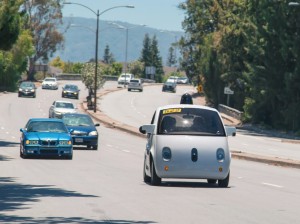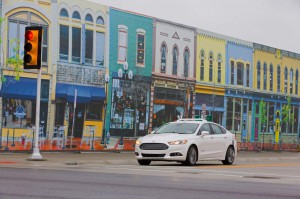Ford Motor Co. and Google are expected to announce a new alliance that will include joint development of autonomous vehicles.
Several sources have confirmed reports that were circulating on Monday indicating the announcement will be made two weeks from now when Ford CEO Mark Fields serves as keynote speaker at the annual Consumer Electronics Show in Las Vegas.
The move could help jump-start the self-driving vehicle program at Ford which was planning to begin testing an autonomous version of its Fusion Hybrid sedan on public roads near its high-tech center in Silicon Valley next month. Ford is generally considered a follower in the emerging field while Google is generally seen as leading the field in autonomous vehicle development.
“We have been and will continue working with many companies and discussing a variety of subjects related to our Ford Smart Mobility plan,” Ford said in an e-mailed statement responding to the news reports. “We keep these discussions private for obvious competitive reasons, and we do not comment on speculation.”
Within just a couple of years, self-driving vehicles have gone from the stuff of science fiction to something set to make a major impact on the automotive world. Tesla recently launched its semi-autonomous AutoPilot system, capable of allowing a vehicle to drive, hands-free on limited-access highways. Mercedes-Benz, General Motors and Nissan are among those expected to soon launch similar systems.
Nissan has also outlined plans to put a fully autonomous vehicle into production by 2020, and industry analysts generally expect that technology to become commonplace by 2025. Driverless cars could follow, though there is debate over just how soon, and new draft rules prepared by the State of California would, for now, require a licensed “operator” to remain behind the wheel, ready to take control in an emergency.
(Click Here to learn more about the new California rules for autonomous vehicles.)
That’s seen as a setback for Google, which was preparing to launch a completely driverless version of its autonomous “Google Car” prototypes in the near future.
The tech giant is widely seen as a leader in the nascent autonomous field, a recent study by Britain’s Juniper Research putting it at the top of the list, ahead of contenders like Tesla, Mercedes and GM. But Google has a critical problem: it doesn’t build cars, and has said it wasn’t planning to go into the automotive manufacturing field.
It has had conversations with a number of makers, including BMW, but if the tie-up with Ford does fall into place, it would be a major breakthrough for both companies.
The deal is expected to come together about the same time that Google is planning to spin off its autonomous vehicle unit as a standalone business unit under the umbrella of newly formed holding company Alphabet. It will be headed by John Krafcik, the former CEO of Hyundai Motor America who was most recently working with online sales firm TrueCar.
(Click Here for more on the expected spin-off of Google’s autonomous program.)
Perhaps not so coincidentally, Krafcik was a fast-rising engineer at Ford before being recruited by Hyundai a decade ago.
The Detroit maker has been seen as racing to catch up to key competitors in the autonomous field – a technology that has become doubly important for Ford in its push to transform itself from being an automotive manufacturer into what CEO Fields has dubbed a “mobility company.”
Among other things, Ford is launching a variety of experiments in car and ride-sharing, and at a briefing earlier this month, Fields and others suggested that autonomous technology would likely play an important role in such services in the years ahead.
Ford recently became the first automaker to begin testing an autonomous vehicle at the special Mcity proving grounds set up by the University of Michigan at a campus in Ann Arbor. Last week, Fields also confirmed plans to begin testing a self-driving vehicle on public roads in Silicon Valley.
The goal is to have “one foot in today, one foot in tomorrow,” he said during the December 10th briefing in Dearborn, Michigan, adding that Ford is ready to “take the actions that will position ourselves to be successful…in five, 10, 15 years.”
According to a report from Yahoo Autos, the deal between Google and Ford would not be exclusive, suggesting the tech company will continue to look for other partners to use its autonomous system.
(For more on Ford’s mobility strategy, Click Here.)



